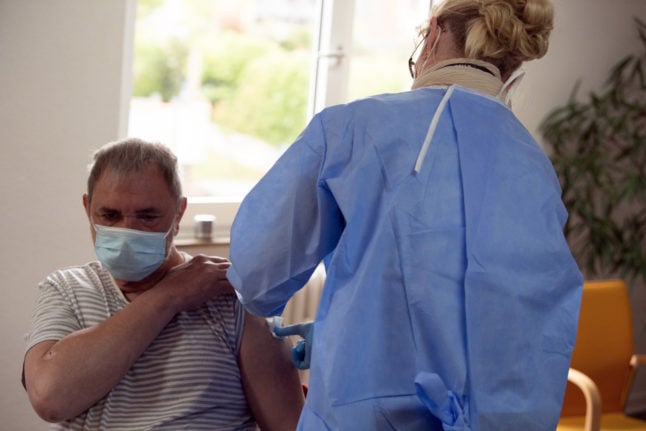They will also be allowed access to shops and other facilities without first providing a negative test result as is currently required of the rest of the population, Justice Minister Christine Lambrecht said on Tuesday while announcing the measures.
They may come into force as early as this weekend if approved by the German parliament on Thursday, and the Bundesrat, which represents the 16 states, on Friday.
There must be a “good reason” for any restrictions on public life, Lambrecht said. “As soon as this reason ceases to exist…these restrictions should then no longer be in place,” she said.
Under national measures introduced in April, areas with an incidence rate of more than 100 new infections per 100,000 people over the last seven days must introduce overnight curfews and people may only meet with one other person from another household during the day.
READ ALSO: What you need to know about Germany’s new nationwide Covid-19 rules
Areas with lower incidence rates are however allowed to open shops, restaurants, cinemas and other facilities to anyone who can provide a negative test.
The new regulation will also put vaccinated people and those who have recovered from a Covid-19 infection on a par with those who can provide a negative test, Lambrecht said.
Some German states, including Berlin and Bavaria, have already announced plans to scrap the negative test requirement for vaccinated people when they go shopping or visit the hairdresser.
READ ALSO: Bavaria and Berlin ease Covid rules for vaccinated people
The Bavarian cabinet on Tuesday also signed off a plan to allow hotels, holiday homes and campsites to open in regions with low incidence rates from May 21st.
Germany has been in some form of virus shutdown since November, with numbers of new infections remaining consistently high amid an initially sluggish vaccination campaign.
But the campaign has since picked up pace, with more than a million jabs issued in one day last week, and new infection numbers have started to come down gradually.
READ ALSO: Germany breaks European record by giving a million Covid jabs in a day
‘We must not jeopardise success’
The Robert Koch Institute health agency recorded 21,953 new infections in the past 24 hours on Thursday and 250 deaths, with a national 7-day incidence rate of 129.1. The incidence has dropped considerably since the end of April.
But despite these successes, critics say it is too soon to be lifting restrictions.
Ute Teichert, the head of the Federal Association of German Public Health Officers, said it was “imperative that vaccinated people continue to be tested”.
“Without comprehensive testing, we will lose sight of the incidence of infections — especially with regard to virus variants,” she told the Funke media group on Tuesday.
READ ALSO: Why are Germany’s coronavirus numbers coming down so sharply?
MP and epidemiologist Karl Lauterbach said it was reasonable to lift some restrictions for vaccinated people, but restaurants, bars and other facilities should not be reopened just for them.
“We must not make the mistake of jeopardising the successes achieved by the national ’emergency brake’,” he warned, referring to the national restrictive measures introduced in April.



 Please whitelist us to continue reading.
Please whitelist us to continue reading.
As a 31 year old expat with only around 5 close friends here I find it infuriating that now we, the young people are the ones that will be paying the price now in the end and possibly missing out on all the summer fun. As I understood it, the lockdowns were to ensure the protection of risk groups in the first place. Now that they are almost all vaccinated, why do the rest have to still stay at home looking at our few lucky friends who’s brothers wife is pregnant or something get to live a full life. If they’re gonna lift restrictions, they better have a plan how to make young people’s lives liveable somehow for the time being since it doesn’t look like we’ll be fully vaccinated before September or so.
Totally understand and I think many people are feeling a similar way.